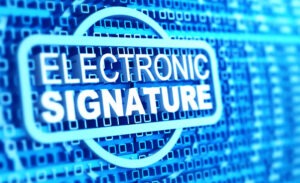
The COVID-19 pandemic has forced many lawyers to work remotely, prompting the need to adjust how they do business.
One such way is offering electronic signatures and notarization. This is our guide to e-signatures to help understand the process and the legality of signing documents online.
Are Electronic Signatures Legally Binding?
In a word, yes.
There are many cases in which judges have ruled in favor of the integrity of eSignatures. Whenever you have consent and intent, which is almost always the case, eSignatures are legally binding, says attorney Bradley Winston.
Trusted software providers that offer the service provide an additional level of security by providing authentication and audit logs, among other features.
Does signing a contract document online hold up legally?
Yes. At the federal level, the Electronic Signatures in Global and National Commerce Act, commonly referred to as ESIGN, allows the “use of electronic records and signatures in interstate or foreign commerce.” The law states that a document can’t be denied solely because an electronic signature or electronic record was used.
Most states have passed the Uniform Electronic Transactions Act, which allows the use of e-signatures. And if they didn’t pass this act, states enacted similar laws such as New York. In essence, every jurisdiction in the country approves the use of e-signatures.
Does my online signature have to be identical to my handwritten signature?
No. The ESIGN e-signature law states, “an electronic sound, symbol, process attached to or logically associated with a contract or other record and executed or adopted by a person with the intent to sign the record and be legally bound.”
Electronic signatures include signatures in emails, PDFs, and faxes and digital signatures provided by platforms like DocuSign and Adobe Sign.
Digital Signatures
A digital signature is not the same as an electronic signature. It’s an encrypted “packet” associated with a document. It’s even more secure than an electronic signature. Here’s why:
“Digital signature software will create a condensed version of a document — called a hash — which will be encrypted using a key in a signatory certificate. This encrypted “hash” is the signature,” according to Winston.
To validate a digital signature, the hash is decrypted with the signatory’s key and compared to the original document.
What contracts can’t be signed with e-signature?
Electronic signatures are accepted on most contract types. However, there are a few documents that can’t be electronically signed:
- Wills
- Trusts
- Adoption
- Divorce
- Official court document and court orders
Note to our readers: Please contact the Winston Law Firm for legal advice and a free consultation.

